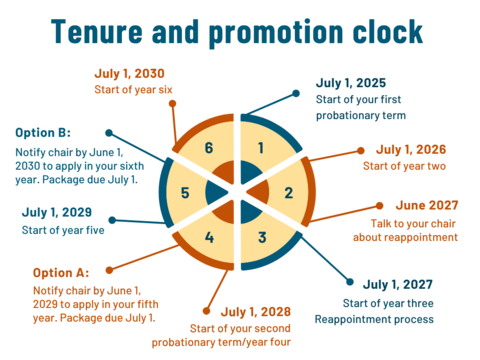Whether you're going up for tenure or promotion next year, or you've just started your first probationary term, it's never too early to learn about the tenure and permanence process!
What you need to know
- The deadlines: Your notice of intent to apply is due to your chair on June 1, and you need to submit your tenure package by July 1, along with the names of at least three (ideally 5 or 6) arms-length external referees. You can do that either one year or two years after you start your second probationary term.
- The extensions available: There are many reasons for extending your probationary period (parental leave, illness, a delay setting up lab equipment, COVID...). If you think this applies to you, it may be helpful to check in with FAUW. For extensions related to illness or disability, talk to Occupational Health. Note that extensions do not increase the committees' expectations of you; that is very explicit in policy.
- The COVID-19 extension is available to anyone who was hired before July 1, 2021.
- The warning signs: If you get negative comments on an annual performance review, take the comments to heart and come check in with us.
- Your options: You have recourse to challenge an unfavourable decision, though proactive strengthening of your tenure file will ideally avoid this step. You can also challenge the involvement of particular referees and DTPPC/FTPPC members on your file, for bias or conflict of interest (i.e., that the person will benefit or be perceived to benefit from the decision).

Who's who in the tenure and permanence process
Tenure and permanence cases go through departmental and faculty-level committees, and then the university president, who also gets input from a university-level committee.
- DTPPC = Department Tenure, Permanence and Promotion Committee (forwards your file to the Dean/FTPPC)
- FTPPC = Faculty Tenure, Permanence and Promotion Committee (forwards your file to the president)
- UTPPC = University Tenure, Permanence and Promotion Committee (advises the president on individual cases and on the comparability of standards across the University)
- UTPPAC = University Tenure, Permanence and Promotion Advisory Committee (serves as advisory members on FTPPCs; advises Senate re: standards, policies and procedures)
Where to find information
- Policy 77 – Tenure and Promotion of Faculty Members. We strongly recommend getting to know this policy well. Ask us questions if you have them.
- Your Faculty’s instructions for applying. The Faculties of Health, and Environment have posted these online.
- The slides from FAUW’s annual workshop on applying for tenure.
- UW Guidelines Regarding T&P Dossiers and Procedures (PDF)

Who to talk to
- Your chair or director will provide an overview of the process, timelines, and expectations for your particular unit.
- A departmental mentor or colleague with experience and insight.
- FAUW if there are any concerns based on annual performance review comments or messages from your chair/director. Be sure to attend our workshop, offered every April.
- Occupational Health if you need an extension related to illness or disability.
Questions to ask
In the years before you apply for tenure, be proactive and ask the following questions:
- Are there any danger signals in my annual performance review that I need to address? Have you had negative or specific comments on some aspect of your performance? If so, please check in with FAUW.
- What are the departmental or school standards for tenure? FAUW and CTE workshops discuss requirements for tenure in a general sense. You must supplement these resources with what is required in your local context.
FAUW’s advice
Be proactive! We can’t stress this enough. Don’t be caught by surprise close to tenure/permanence application time. Consult with colleagues, attend workshops, and gather information to inform your tenure/permanence brief early.
Keep your audience in mind: Your candidate’s brief should be written not just for your departmental or school committee, but also for those who don’t know your area. Explain the importance of your research and discipline as well as the impact that you have made.
Think carefully about when to apply
It is standard to apply in either the second year or third year of your second probationary term. Put another way, you submit your intent to apply either June 1 one year after you start your second probationary term, or June 1 two years after you start your second probationary term. Both options are completely normal; these are not “early” or “late” options.
- Applying “early” refers to applying before the second year of your second probationary term, which is rare and requires agreement from your dean and DTPPC, and usually documentation in your appointment letter when you were hired.
Things to consider that may affect your choice:
- Have you taken your pre-tenure sabbatical leave? (You should.) *This is not available to teaching-stream faculty members.
- Have you addressed any concerns expressed in your probationary reappointment letter, your performance reviews, or by students?
- Have you discussed it with your mentor?
- Have you discussed it with your chair?